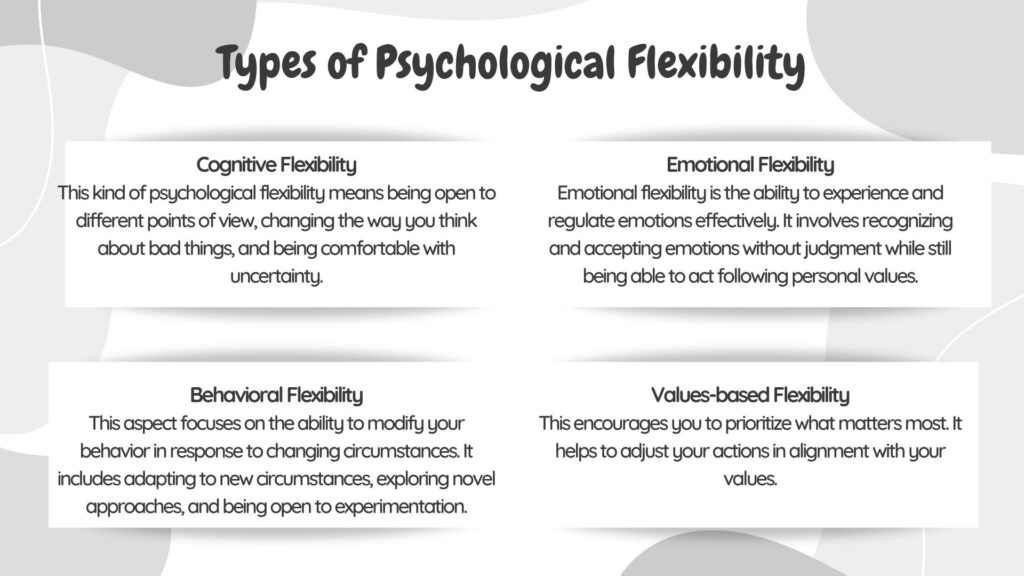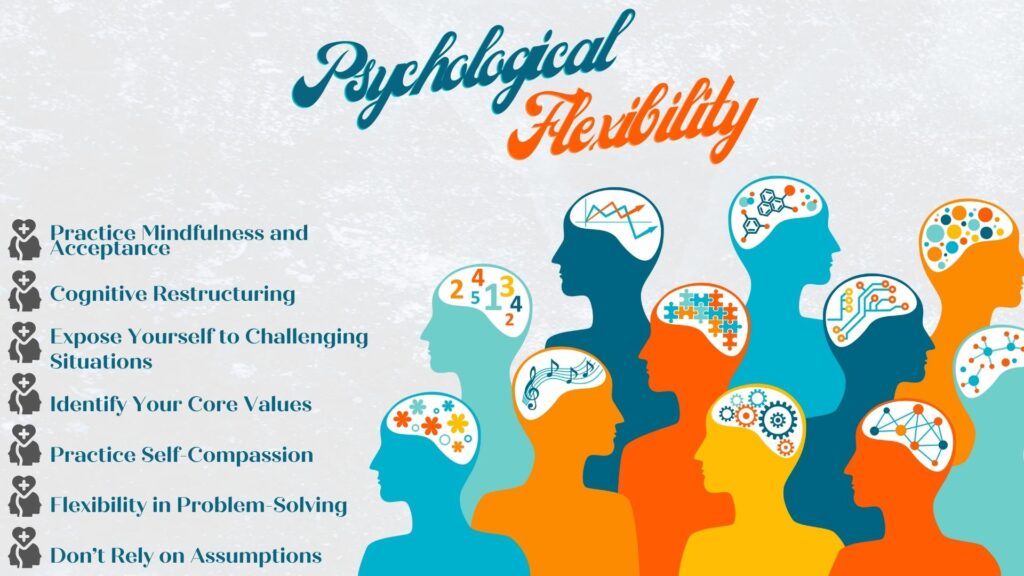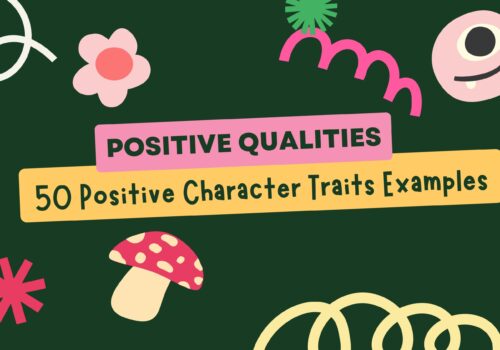When Life Throws Lemons at You, Make Lemon Juice.
That’s one way of expressing psychological flexibility. Life is a big challenge where we constantly face situations that impact our well-being. It would be nice to find a way to cope with problems without being impacted by the short-term emotions of stress. Psychological flexibility allows us to do just that. Psychological flexibility can be defined as being mindful of the present. It is aware of your emotions and thoughts, accepting them, including the negative ones, and adopting a flexible mindset. A flexible mind helps us look at problems in a different light; it enables us to manage a situation more positively and make better decisions. In this article, you will learn psychological flexibility and how to develop it for a more fulfilling life.
Psychological Flexibility and ACT
Psychological flexibility is the core concept of Acceptance and Commitment Therapy or ACT, developed by renowned American clinical psychologist Steven C Hayes. According to Professor Hayes, ACT is a form of psychotherapy that encourages mindfulness to accept negative thoughts, feelings, and emotions rather than fight them. Accepting your circumstances can lead to increased psychological flexibility, which helps you stop avoiding negative thoughts, emotions and circumstances which can cause more problems. This mindset encourages you to make decisions based on your values and long-standing beliefs rather than the short-term emotions that you might be experiencing. Not only do you learn to face your demons, but psychological flexibility also increases your commitment to healthier, constructive activity to respond effectively to life’s inevitable ups and downs.
Types of Psychological Flexibility
- Cognitive Flexibility: This kind of psychological flexibility means being open to different points of view, changing the way you think about bad things, and being comfortable with uncertainty.
- Emotional Flexibility: Emotional flexibility is the ability to experience and regulate emotions effectively. It involves recognizing and accepting emotions without judgment while still being able to act according to personal values.
- Behavioral Flexibility: This aspect focuses on the ability to modify your behavior in response to changing circumstances. It includes adapting to new circumstances, exploring novel approaches, and being open to experimentation.
- Values-based Flexibility: This encourages you to prioritize what matters most. It helps to adjust your actions in alignment with your values.

Benefits of Psychological Flexibility
In times of change and difficulty, developing psychological flexibility is more important than ever. Research found how psychological flexibility can help you deal with stress, anxiety, sadness, PTSD, and other mental and physical health problems. Studies have also shown that being mentally flexible makes people more resilient and helps them deal with chronic pain.
Trying too hard to get rid of things that scare you is easy; all you need to do is avoid them, but getting rid of your inner experiences is tough. For example, if you lack confidence at work, are afraid to fail, or experience bouts of anger, nervousness and frustration, these feelings become problematic. Fighting these feelings can drain you of energy and force you to withdraw from life, friends, and family. By being mentally flexible, you face these issues to make safer decisions in line with what you value the most.
By developing psychological flexibility, you will find your life-changing for the better. The actuality is that life is the same; you develop a more positive outlook on life. With psychological flexibility, you can expect to learn the following.
- Take proactive steps instead of reactive actions
- Regulate your emotions
- Reduce anxiety and depression
- Increase emotional resilience
- Develop a stronger connection between families
- Live a meaningful life
- Live a healthier life
7 Ways to Develop Psychological Flexibility

1. Practice Mindfulness and Acceptance
Mindfulness or focusing on the present can benefit you emotionally and physically. For example, take a walk in a park, and enjoy the sensations, the breeze, and the color of the trees and flowers. Absorb everything you see and feel. Practices like meditation, breathing exercises, and writing in a journal can help you become more mindful. Accept your thoughts and feelings without judging them. Do not hold on to negative thoughts or try to resist them. Allow them to come and go.
2. Cognitive Restructuring
Cognitive restructuring helps you challenge and rethink negative thoughts and beliefs—practice identifying cognitive distortions and thoughts that perceive problems as disastrous. Cognitive distortions are thoughts and mental biases that can make you miserable, fuel anxiety, and make you feel bad about yourself. Accept your thoughts without the importance your mind adds to them. When you think too much in a negative fashion, the mind tends to build upon those thoughts. Rather than dwell on the negativity and lose hope in a challenging situation, replace your thoughts with more balanced and realistic perspectives. Try to look at the problem from a different angle.
3. Expose Yourself to Challenging Situations
Gradually expose yourself to fearful situations or triggers. This helps you desensitize the negativity of tough situations. It helps you build resilience and reduce anxiety. Start with small steps and gradually increase exposure. Allow yourself to adapt and learn how to cope with discomfort. By exposing yourselves to challenges, sooner or later, what seemed perplexing, becomes a routine situation.
4. Identify Your Core Values
Reflect on your core values and what truly matters to you. Consider how your actions align with those values and adjust accordingly. Immerse yourself in activities that prioritize your values, and do meaningful things that give you a sense of purpose. For example, if family time is more important than a demanding task, family time should be your first choice.
5. Practice Self-Compassion
Do not be too hard on yourself. Taking on pressure at work is good for self-improvement, but blaming yourself too much for failure damages your self-esteem. Studies have shown how self-compassion is important for improving mental well-being. Offer yourself the same empathy and support you would give a close friend. Accept and acknowledge imperfections and setbacks as a natural part of your evolution and the human experience.
6. Flexibility in Problem-Solving
When faced with obstacles, or tough situations, explore different solutions and open yourself up to new possibilities. Adopt a growth mindset that embraces learning and adaptation. Ask others for their feedback because others might see something you missed. Consider alternative perspectives to broaden your problem-solving skills and be more creative.
7. Don’t Rely on Assumptions
Jumping to conclusions or making assumptions is never a good idea. In most cases, things are never how they appear; therefore, reacting because of an assumption could lead to regret and hurt your relationship with those who matter. Assumptions poison your mind towards situations and people. First, get your facts right, then react.
Conclusion
Psychological flexibility is vital to your mental health. Being flexible helps you achieve growth, be happy and help you be more creative. It encourages healthier relationships. We can cultivate psychological flexibility and foster emotional resilience and well-being through mindfulness, acceptance, cognitive restructuring, and other practical strategies. Psychological flexibility helps you take on the eventful journey of life with an open mindset to adapt and bounce back from adversity to lead a more fulfilling life.
















